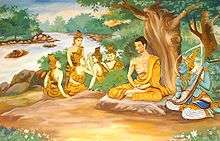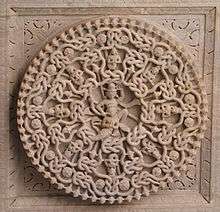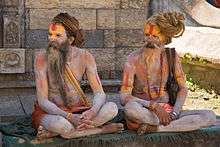

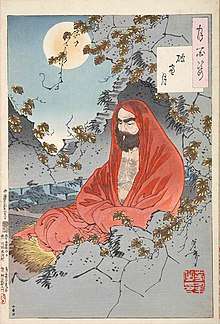

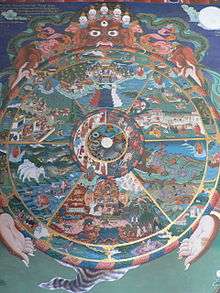


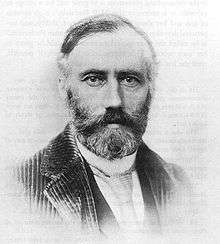

Putting their soul power to the karmic wheel. ~ John Lennon
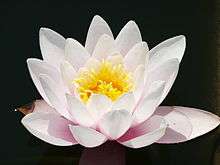
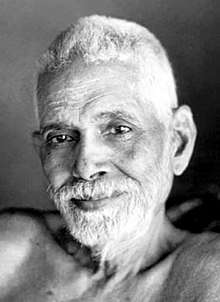

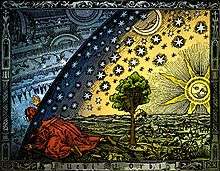


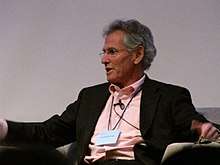

.jpg)

Karma (Sanskrit: कर्म; IPA: [ˈkarmə] ( listen); Pali: kamma) means action, work or deed; it also refers to the principle of causality where intent and actions of an individual influence the future of that individual, also known as the Law of Cause and Effect. Good intent and good deeds contribute to good karma and future happiness, while bad intent and bad deeds contribute to bad karma and future suffering. The concept's earliest recorded origins are in ancient India. It is a key concept in Hinduism, Buddhism, Jainism, Sikhism, Taoism, Shintoism, Ching Hai, Esotericism and others.
A
- Whatever karma a soul has acquired through its own prior needs,
it will obtain the good and bad results thereof.
If one can obtain results from the deeds of others,
then surely his own deeds would be meaningless.
Except for karma earned for oneself by oneself,
no one gives anything to anyone.
Reflecting upon this fact, therefore,
let every person unwaveringly,
abandon the perverse notion that
another being can provide him with anything at all.- Acaraya Amitagati, in Collected Papers on Jaina Studies, quoted by Padmanabh S. Jaini, p. 136
- This emphasis on reaping the fruits only of one's own karma was not restricted to the Jainas; both Hindus and Buddhist writers have produced doctrinal materials stressing the same point. Each of the latter traditions, however, developed practices in basic contradiction to such belief. In addition to shraddha (the ritual Hindu offerings by the son of deceased), we find among Hindus widespread adherence to the notion of divine intervention in ones fate, while Buddhists eventually came to propound such theories like boon-granting Bodhisattvas, transfer of merit and like. Only Jainas have been absolutely unwilling to allow such ideas to penetrate their community, despite the fact that there must have been tremendous amount of social pressure on them to do so
- Acaraya Amitagati's saying summarized by Padmanabh S. Jaini, in "Collected Papers on Jaina Studies", p. 136
- They explain all the inequalities and diversities of life and character by the law of "Karma, which governs the process of Reincarnation as well as the gradual evolution of the germs of life from lower to higher stages of existence.
- No system indeed by its own force can bring about the change that humanity really needs; for that can only come by its growth into the firmly realised possibilities of its own higher nature, and this growth depends on an inner and not an outer change. But outer changes may at least prepare favourable conditions for that more real amelioration,... or on the contrary they may lead to such conditions that the sword of Kalki can alone purify the earth from the burden of an obstinately Asuric humanity. The choice lies with the race itself; for as it sows, so shall it reap the fruit of its Karma.
- Sri Aurobindo, 1920, quoted from Sri Aurobindo, ., Nahar, S., Aurobindo, ., & Institut de recherches évolutives (Paris). India's rebirth: A selection from Sri Aurobindo's writing, talks and speeches. Paris: Institut de Recherches Evolutives. 3rd Edition (2000).
B
- The Law of Karma is today a great and incontrovertible fact in the consciousness of humanity everywhere. They may not call it by that name, but they are well aware that in all today's events the nations are reaping what they sowed. This great law - at one time a theory - is now a proven fact, and a recognized factor in human thinking. The question "Why?", so frequently asked, brings in the factor of cause and effect with constant inevitability.
- Alice Bailey in 'A Treatise on the Seven Rays: Volume 4: Esoteric Healing, p. 262, (1953)
- Karma is therefore that which Man . . . has instituted, carried forward, endorsed, omitted to do, or has done right, through the ages until the present moment. Today, the harvest is ripe and mankind is reaping what it has sown, preparatory to a fresh ploughing in the springtime of the New Age, with a fresh sowing of the seed which will (let us pray and hope) produce a better harvest.
- Alice Bailey in 'A Treatise on the Seven Rays: Volume 4: Esoteric Healing, p. 263, (1953)
- Men interpret these dimly sensed laws in terms of finality, and from their little point of view. The idea of retribution runs through much of the teaching on karma, for instance, because men seek a plausible explanation of things as they appear to be, and are themselves fond of dealing out retribution. Yet there is far more general good karma than bad, little as you may think it when immersed in such a period as the present.
- Alice Bailey in 'A Treatise on the Seven Rays: Volume 4: Esoteric Healing, p. 20/2, (1953)
- Karma ~ An immutable law, which has its aspect just in the akasa principle, is the law of cause and effect. Each cause sets free a corresponding effect. This law works everywhere as the most sublime rule. Consequently every deed proceeds from a cause or is followed by any result. Therefore we should not only accept Karma as a rule for our good actions, as the oriental philosophy puts it, but its signification reaches farther and is a very deep one. Instinctively all men have the feeling that something good can bring good results only and again all the evil must end up with evil or, in the words of a proverb, “Whatsoever a man sows, that shall he reap”. Everybody is bound to know this law and to respect it. This law of cause and effect governs the elemental principles, too. I have no intention to enter into details of this law, which could be expressed in a few words, as they are quite clear so that every reasonable man will understand them. Subject to this law of cause and effect is also the law of evolution or development. Thus development is an aspect of the karma law.
- Karma brings us ever back to rebirth, binds us to the wheel of births and deaths. Good Karma drags us back as relentlessly as bad, and the chain which is wrought out of our virtues holds as firmly and as closely as that forged from our vices.
- Annie Besant, Karma, p. 64
- Though the names karma yoga and sannyasa are different, the truth at the heart of both is the same.
- Vinoba Bhave, in Aryan Path, Volume 31, p. 508
- The Gita uses the word ‘karma’ (action) in the sense of swadharma. We eat, drink, sleep; these are all actions. But these are not the actions that the Gita refers to when it talks of karma. Karma refers to the performance of swadharma. But in order to attain desirelessness through such karma, an important aid is necessary. One must overcome desire, attachment and anger. One cannot have desirelessness unless and until the mind has become pure and calm like the waters of the Ganga. The actions necessary for the purification of mind are called vikarma by the Gita. Karma, vikarma and akarma—these three terms are important... Karma means the outward actions done in the pursuit of swadharma. Vikarma means total involvement of the mind therein.
- Vinoba Bhave, in Talks on the Gita, p. 48-49
- Karma is very much needed to enable us to understand the state of our minds. We can remove our defects only when we become aware of them. If we are not aware of them, all efforts for progress and growth will come to naught. It is while doing work that we become aware of our defects. Vikarma is then to be employed to get rid of those defects. With ceaseless application of vikarma inwardly, we will gradually come to know how to remain detached while performing swadharma, how to remain beyond desires and passions, anger, greed, temptations and delusions. When there is a constant endeavour to purify karma, pure karma will follow naturally and effortlessly.
- Vinoba Bhave, in "Talks on the Gita", p. 57
- When one unacquainted with the noble doctrine looks around him, and observes the inequalities of birth and fortune, of intellect and capacities; when one sees honour paid fools and profligates, on whom fortune has heaped her favours by mere privilege of birth, and their nearest neighbor, with all his intellect and noble virtues -- far more deserving in every way -- perishing of want and for lack of sympathy; when one sees all this and has to turn away, helpless to relieve the undeserved suffering, one's ears ringing and heart aching with the cries of pain around him -- that blessed knowledge of Karma alone prevents him from cursing life and men, as well as their supposed Creator.
- We believe in an unerring law of Retribution, called Karma, which asserts itself in a natural concatenation of causes and their unavoidable results... We consider it (karma) as the Ultimate Law of the Universe, the source, origin and fount of all other laws which exist throughout Nature. Karma is the unerring law which adjusts effect to cause, on the physical, mental and spiritual planes of being.
- Our philosophy has a doctrine of punishment as stern as that of the most rigid Calvinist, only far more philosophical and consistent with absolute justice. No deed, not even a sinful thought, will go unpunished; the latter more severely even than the former, as a thought is far more potential in creating evil results than even a deed.
- Spiritual holy love is immortal, and Karma brings sooner or later all those who loved each other with such a spiritual affection to incarnate once more in the same family group.
- H.P. Blavatsky, The Key to Theosophy (1889)
- Karma is... the fruit of the actions of the tree which is the objective personality visible to all, as much as the fruit of all the thoughts and even motives of the spiritual “I”; but Karma is also the tender mother, who heals the wounds inflicted by her during the preceding life, before she will begin to torture this Ego by inflicting upon him new ones.
- When one unacquainted with the noble doctrine looks around him, and observes the inequalities of birth and fortune, of intellect and capacities; when one sees honour paid fools and profligates, on whom fortune has heaped her favours by mere privilege of birth, and their nearest neighbor, with all his intellect and noble virtues -- far more deserving in every way -- perishing of want and for lack of sympathy; when one sees all this and has to turn away, helpless to relieve the undeserved suffering, one's ears ringing and heart aching with the cries of pain around him -- that blessed knowledge of Karma alone prevents him from cursing life and men, as well as their supposed Creator.
- H.P. Blavatsky, The Key to Theosophy (1889)
- To go from mortal to Buddha, you have to put an end to karma, nurture your awareness, and accept what life brings.
- Bodhidharma, in The Zen Teaching of Bodhidharma, p. 35
- What kind of life a person is reborn into depends on Karma. Karma refers to all the deeds, words, and thoughts of one’s life. Buddhists believe karma is the deciding factor in one's fate in his or her next life.
- Buddhism, as explained by Walter Hazen, in Inside Buddhism, p. 12
- Unlike the Hindu concept of karma, however, karma in Buddhism is not deterministic since there is in Buddhism no idea of a God who is the controller of karma; rather Buddhism takes karma as moral power, emphasizing the possibility of final release from the round of transmigration through a free decision of the will. Accordingly, on the one hand, we are bound by our own karma which shares in and inseparably linked to karma operating in the universe.
- Karma [represents] intentional actions that affect one’s circumstances in this and future lives. The Buddha’s insistence that the effect depends on volition marks the Buddhist treatment of karma as different from the Hindu understanding of karma.
- Buddhists believe that the rebirths that arise are a result of the karma we have. Karma is the idea that every action has a reaction. If people do good then good will follow. If people choose to do evil, then evil will follow or as s you sow so will you reap. The results of the karma can be experienced in the present lifetime, even day by day.
- In Buddhism, karma can go from one life time to another and therefore it is vital that people try to live the best life they can, as they will often have the bad karma of previous lifetimes to deal with. Karma will determine whether people reach enlightenment or have to live 1000 lifetimes of a lesser animal in order to get to the truth.
- Karma just does not work for individuals but can also have an effect on the whole nation or the whole planet. Buddhists talk about collective karma, when the consequences of action taken by whole countries can often change things. For example, Buddhists would argue that the way rich nations treat the poor nations of the world may well affect the karma of a whole country or a group a such as the United Nations.
- Cavan Wood, In "Buddhism", p. 17
- I'm a true believer in karma. You get what you give, whether it's bad or good.
- Sandra Bullock, in Happiness Is A Choice, p. 23
C
- A man is born alone and dies alone; and he experiences the good and bad consequences of his karma alone; and he goes alone to hell or the Supreme abode.
- Chanakya, in Chanakya Niti, p. 13
- There comes a time when... the man or woman in incarnation... ceases to make too much karma of a negative nature, and becomes more and more harmless. We can see, therefore, the need for harmlessness in all human relationships.
- The Law of Karma is the Law of Cause and Effect. The effects from our previous deeds, good and bad, create the conditions of our life today, and the results of our deeds today create the conditions of the next period of life, either now or when we return in our next body.
When we learn to be harmless, we overcome karma. There comes a time when... he or she ceases to make too much karma of a negative nature, and becomes more and more harmless. We can see, therefore, the need for harmlessness in all human relationships. By being destructive we create negative karma, which means we have to work it off. We come in with this karma, and all the misfortune of our life, the pain, the suffering, is put down to bad luck. It is not bad luck but the direct result of our karma.- Benjamin Creme, in The Ageless Wisdom Teaching, Glossary of Esoteric Terms, (1996), p.13-15
- What makes karma a major problem for people is their inability to deal with it, to recognize their own responsibility for it, and to do something about it. Most people blame their problems on other people or on circumstances: it was their upbringing, the fact that their parents did not love them, or got divorced, or left them wanting, or that their husband left them, or did not leave them... We have to learn to deal with karma equably and say: “That’s life; it is, simply, life. C’est la vie.” Life is another name for karma. What we call ‘life’ is a flow of karma, good and bad, pleasant or unpleasant — it is all one flow of life. When it is unpleasant we say: “What a life!” When it is pleasant we say: “Isn’t life great?” It depends on how we feel, how we respond to the load of karma which we all have to bear. What holds us back in evolution is the karma which is always sitting on our shoulders and is not burnt away in the fire of service. Burn up the karma in the fire of service and you will go...
- Benjamin Creme, in The Art of Co-operation. Share International Foundation,(2002) p.34/5
D
- How people treat you is their karma; how you react is yours.
- Wayne W. Dyer, in The Soulful 7, p. 100
E
- Samsara is the belief that we are stuck in a karmic wheel of suffering and, until we realize our full spiritual potential, we keep returning to learn and understand our ultimate being. Karma plays a huge part in this belief because it is your Karma that decides whether you evolve or devolve at your next birth, Samsara is symbolized as the endless knot.
- Nicholas Eldridge on Buddhism, in Where Do We Begin, p. 48
F
G
- Endless knot: The intertwined lines symbolize that all phenomena are interdependent and joined together in a closed cycle of karmic cause and effect. The endless knot also represents the infinite wisdom of the Buddha - without beginning and without end - and the union of compassion and wisdom. And it signifies the illusory character of time, because it is endless.
- Madonna Gauding, in The Signs and Symbols Bible: The Definitive Guide to Mysterious Markings, p. 136
- If thou deemest that (the path of) understanding is more excellent than (the path of) action, O, Janaradhna (Krishna), when dost thou urge me to do this savage deed, O, Kesava, Krisna?
- Bhagavad Gita (section Chapter 3.1.2 (Karma yoga) ), in Hindu Spirituality Vedas Through Vedanta
- In Hinduism, the Law of Karma is viewed as a divinely sustained and revealed universal Law. The law of karma encourages us to rely on ourselves.
- Bhagavad Gita, in Explore Hinduism, p. 77
H
- Only by spiritual practice can we break through our karma and the effects of the causes we have made. Only then can we escape from them. It matters not whether you have acquired any merit. Merit is merit. Karma is karma. Nonetheless, if one practices the Quan Yin Method, one can be liberated regardless of having any merit or not. It is so logical, so scientific.
- The world is transitory. You will achieve stability only on the path of karma yoga. Only action can take a man to God and give him liberation. The law of karma is so deep that no words are great enough to describe it. The day karma stops on this earth will be the day of its dissolution (pralaya).
- Haidakhan Babaji, The Teachings of Babaji, 19 September 1983.
- Karma Yoga is also beneficial for your health; you will sleep well and have a good appetite. A man with good appetite and sound sleep is always a healthy man and with good health he can achieve anything in life.
- Haidakhan Babaji, The Teachings of Babaji, 17 August 1983.
- John phoned me up one morning in January and said, "I've written this tune and I'm going to record it tonight and have it pressed up and out tomorrow — that's the whole point: Instant Karma", you know." So I was in. I said, "OK, I'll see you in town." I was in town with Phil Spector and I said to Phil, "Why don't you come to the session?" There were just four people: John played piano, I played acoustic guitar, there was Klaus Voormann on bass, and Alan White on drums. We recorded the song and brought it out that week, mixed — instantly — by Phil Spector.
- George Harrison, on John Lennon's song "Instant Karma!", as quoted in "Instant Karma!" at The Beatles Bible
- Karma has two unique attributes: first in quantity and quality it provides for like-for-like (i.e good for good, bad for bad, more for more, less for less), Second the fruits of one’s actions are non-transferable. We enjoy the fruits of our good actions and suffer the consequences of bad actions in this life or future life.
- In Hinduism quoted in "Explore Hinduism", p. 77
- Since the karmic time is cyclic, karma works through many lives. What we are suffering (or enjoying) now at least in part due to the consequences of what we have done in the past lives. The Upanishad says ’You are what you desire is. As is your desire so is your deed. As is your deed is so is your destiny.' Because of karma, one is reborn again and again until the effects of all accumulated karma are dissipated and one reaches ‘the other shore’ moksha. When the physical body is annihilated by death, the Karmic seeds remain embedded in the subtle body and determine the course of future life.
- In Hinduism quoted in "Explore Hinduism", pp.77-78
- Hindus view the Law of Karma as a divine law, without which cosmic justice is neither achievable, nor imaginable.
- In Hinduism quoted in "Explore Hinduism", p. 78-79
- The Vedic seers discovered the Law of Karma over eight thousand years ago and immortalized in the Vedas.
- In Hinduism quoted in "Explore Hinduism", p. 79
- The past karma of an individual consists of two parts, prarabdha karma and sanchita karma. The prarabdha karma is the part of one’s past karma which is to bear fruit in the present life of the individual. The sanchita karma is the accumulated karma of the previous births, which is to bear fruits in the future. The karma, which is being done now will produce results in the future and is called the agami karma (other names are kriyamana karma and vartamana karma). In Hindu tradition these karmas are compared to an archer and a bow. The arrows that have been shot by the archer, which are already on their way to the target and the archer has no control over them are akin to prarabdha karma. The arrows he is about to shoot are akin to the agami karma and the arrows lying in his quiver are akin to the sanchit karma. This illustrates the Hindu view that one has no control over prarabdha karma, but full control over sanchit and agami karmas.
- In Hinduism quoted in "Explore Hinduism", p. 74
- You and I have been physically given two hands and two legs and half-decent brains. Some people have not been born like that for a reason. The karma is working from another lifetime.
- Glenn Hoddle, in Is Believing in God Irrational?, p. 75
I
- To desire and make a display of clothing is karma for the path of beasts. To greedily Crave food is karma for the path of famished ghosts.
- Ippen, in No abode: the Record of Ippen, p. 105
- That swarm of ants that I observed, each one following the one ahead, have every one been Indra in the world of the gods by virtue of their own past action. And now, by virtue of their deeds done in the past, they have gradually fallen to the state of ants.
- Krsna, Indra and the Ants Indra and the Ants, Classical Hindu Mythology: A Reader in the Sanskrit Puranas, Pg. 321 by Cornelia Dimmitt
J
- Jivas (souls) are either caught by karma (action) in the world of reincarnation (samsara) or liberated (mukta) and perfected (siddha).
- In Jainism, this term has two meanings. 1)Action or activity in the sense of karma-bhumi lands and karmans. 2) a type of extremely subtle matter (pudgala) that is attracted to the soul (jiva) by actions of body, speech and mind. It is bound with the soul whenever actions are motivated by passions (Kasayas).
- Jainism, in The A to Z of Jainism quoted by Kristi L. Wiley, p. 118
- Most Indian systems employ the term karma to designate certain traces (vasanas) or seeds (bija) left behind, as it were by one’s deeds. These residual factors will someday bear fruit in the sense of generating or conditioning experience; thus it is said : Every action must eventuate in an appropriate reward or retribution to the performer of that action. Jainas adhere to the general outlines of this view. But they stand alone in asserting unequivocally that karma is itself actual matter, rather than the sort of quasi-physical or psychological elements envisioned by other schools.
- Padmanabh S. Jaini, in The Jaina Path of Purification, p. 112
- Jainism conveys a totally different meaning of Karma as commonly understood in the Hindu philosophy and western civilization. According to Tatvartasutra, karma is a mechanism that makes us thoroughly experience the themes of our life until we've gained optimal knowledge from them and until our emotional attachment to these themes falls off.
- Hermann Kuhn, in Ultimate Truth, Book 1, quoted by Peter C. Rogers, p. 58
- Again, you can't connect the dots looking forward; you can only connect them looking backwards. So you have to trust that the dots will somehow connect in your future. You have to trust in something - your gut, destiny, life, karma, whatever. This approach has never let me down, and it has made all the difference in my life.
- Karma is a beneficent law wholly merciful, relentlessly just, for true mercy is not favor but impartial justice... With reincarnation the doctrine of karma explains the misery and suffering of the world, and no room is left to accuse Nature of injustice.
- Karma is an unfamiliar word for Western ears. It is the name adopted by Theosophists of the nineteenth century for one of the most important of the laws of nature. Ceaseless in its operation, it bears alike upon planets, systems of planets, races, nations, families, and individuals. It is the twin doctrine to reincarnation. So inextricably interlaced are these two laws that it is almost impossible to properly consider one apart from the other. No spot or being in the universe is exempt from the operation of Karma, but all are under its sway, punished for error by it yet beneficently led on, through discipline, rest, and reward, to the distant heights of perfection. It is a law so comprehensive in its sweep, embracing at once our physical and our moral being, that it is only by paraphrase and copious explanation one can convey its meaning in English. For that reason the Sanskrit term Karma was adopted to designate it. Applied to man's moral life it is the law of ethical causation, justice, reward and punishment; the cause for birth and rebirth, yet equally the means for escape from incarnation. Viewed from another point it is merely effect flowing from cause, action and reaction, exact result for every thought and act. It is act and the result of act; for the word's literal meaning is action.
- It is... the universal law of harmony which unerringly restores all disturbance to equilibrium. In this the theory conflicts with the ordinary conception about God, built up from the Jewish system, which assumes that the Almighty as a thinking entity, extraneous to the Cosmos, builds up, finds his construction inharmonious, out of proportion, errant, and disturbed, and then has to pull down, destroy, or punish that which he created. This has either caused thousands to live in fear of God, in compliance with his assumed commands, with the selfish object of obtaining reward and securing escape from his wrath, or has plunged them into darkness which comes from a denial of all spiritual life. But as there is plainly, indeed painfully, evident to every human being a constant destruction going on in and around us, a continual war not only among men but everywhere through the whole solar system, causing sorrow in all directions, reason requires a solution of the riddle. The poor, who see no refuge or hope, cry aloud to a God who makes no reply, and then envy springs up in them when they consider the comforts and opportunities of the rich... Turning to the teacher of religion, they meet the reply to their questioning of the justice which will permit such misery to those who did nothing requiring them to be born with no means, no opportunities for education, no capacity to overcome social, racial, or circumstantial obstacles, "It is the will of God."
K
- ... innumerable ages ago and now because of faults and sins in that lifetime I was being degraded to a more grievous domain of existence and my karma was to be born in America where nobody has any fun or believes in anything, especially freedom.
- Brahman/Achheram word is the immutable self on which all that lives, moves and has its being rests. Self is the spirit in man and nature. Karma is the creative impulse out of which life’s forms issue. The whole cosmic evolution is called karma.
- Prof. Jitendra Dhoj Khand on Hinduism, in Supreme God: Body, Will, Wisdom, and Work], p. 113
- Karma means work/activity/deed. It refers thought, action, and devotion. It is believed that a s/he’s Karma accumulates past and present years, with wrong deeds increasing the negative side, and good deeds such as help, kindness, soberness, and ascentism, increasing the positive.
- Prof. Jitendra Dhoj Khand, in "Supreme God: Body, Will, Wisdom, and Work", P.207
- The soul continuously undergoes modifications as per the Karma/work it attracts and hence reincarnates in the [following] four states of existence: As a Demi God in Heaven, or as Tormented (tortured soul in hell, or as Human Beings on Continents, or as an Animal, or Plant or as a microorganism.
- Prof. Jitendra Dhoj Khand, in "Supreme God: Body, Will, Wisdom, and Work", P.112
- The soul is always found to be in bondage (with its Karma) since the beginingless time and hence continuously undergoes the cycle of birth and death in these four states of existence until it attains liberation.
- Prof. Jitendra Dhoj Khand, in "Supreme God: Body, Will, Wisdom, and Work", p. 113
- At the beginning of time I declared two paths for the pure heart: jnana yoga, the contemplative path of spiritual wisdom, and karma yoga, the active path of selfless service. One who shirks action does not attain freedom; no one can gain perfection by abstaining from work. Indeed, there is no one who rests for even an instant; all creatures are driven to action by their own nature... Those who abstain from action while allowing the mind to dwell on sensual pleasure cannot be called sincere spiritual aspirants. But they excel who control their senses through the mind, using them for selfless service. Fulfill all your duties; action is better than inaction. Even to maintain your body, Arjuna, you are obliged to act. Selfish action imprisons the world. Act selflessly, without thought of personal profit.
- Lord Krishna speaking to Arjuna in The Bhagavad Gita, Chapter 3
- At the beginning, mankind and the obligation of selfless service were created together. Through selfless service, you will always be fruitful and find the fulfillment of your desires: this is the promise of the Creator... Every selfless act, Arjuna, is born from Brahman, the eternal, infinite Godhead. Brahman is present in every act of service. All life turns on this law O Arjuna. Those who violate it, indulging the senses for their own pleasure and ignoring the needs of others, have wasted their life. But those who realize the Self are always satisfied. Having found the source of joy and fulfillment, they no longer seek happiness from the external world. They have nothing to gain or lose by any action; neither people nor things can affect their security. Strive constantly to serve the welfare of the world; by devotion to selfless work one attains the supreme goal of life.
- Lord Krishna speaking to Arjuna in The Bhagavad Gita, Chapter 3
L
- Karma is often thought as an eye for an eye and a tooth for a tooth....As you sow, so shall you reap encompasses the meaning of karma better but this also does not do justice to the complexity of this law.
- Gina Lake, in Symbols of the Soul: Discovering Your Life Purpose and Karma Through Astrology, p. 9
- Ethics is as crucial to a politician as it is to a religious practitioner. Dangerous consequences will follow when politicians and rulers forget moral principles. Whether we believe in God or karma, ethics is the foundation of every religion.
Instant Karma's gonna get you
Gonna knock you off your feet
Better recognize your brothers
Everyone you meetWhy in the world are we here?
Surely not to live in pain and fear
Why on Earth are you there
When you're everywhere
Gonna get your shareWell, we all shine on
Like the moon and the stars and the sun
Yeah, we all shine on
C'mon and on and on, on, on- John Lennon, in "Instant Karma!" (written 27 January 1970)
- So keep on playing those mind games together
Doing the ritual dance in the sun.
Millions of mind guerrillas
Putting their soul power to the karmic wheel.
- It just came to me. Everybody was going on about karma, especially in the Sixties. But it occurred to me that karma is instant as well as it influences your past life or your future life. There really is a reaction to what you do now. That's what people ought to be concerned about. Also, I'm fascinated by commercials and promotion as an art form. I enjoy them. So the idea of instant karma was like the idea of instant coffee: presenting something in a new form. I just liked it.
- John Lennon, on his song "Instant Karma!", prompted by conversations with Melinde Kendall, the wife of Yoko Ono's former husband Tony Cox, who had used the phrase "Instant Karma", as quoted in All We Are Saying: The Last Major Interview with John Lennon and Yoko Ono (2000) by David Sheff
- I believe that the Laws of Karma do not apply to show business, where good things happen to bad people on a fairly regular basis.
M
- I'm kind of crazy with karma. I really believe that everything you do revisits you, so, I'm really adamant about the kids seeing the grandparents, so like, I can see my grandkids, you know what I mean?
- The law of Karma is a manifestation of God’s will. [He said] that prior to Self-realisation there is a personal God, Iswara, who controls each person’s destiny. It is Iswara who has ordained that everyone must suffer the consequences of his actions and it is Iswara who selects the sequences of activities that each person must undergo in each lifetime. One cannot escape from Iswara’s jurisdiction while one still identifies with the activities of the body. The only way to become free of his authority is to transcend Karma completely by realising the Self.
- Ramana Maharshi, in Karma & Destiny, quoted by David Godman.
- If the agent, upon whom the Karma depends, namely the ego, which has come into existence between the body and the Self, merges in its source and loses its form, how can the Karma, which depends upon it, survive? When there is no ‘I’ there is no Karma.
- Ramana Maharshi, in "Karma & Destiny"
- A man might have performed many Karmas in his previous births. A few of these alone will be chosen for this birth and he will have to enjoy their fruits in this birth. It is something like a slide show where the projectionist picks a few slides to be exhibited at a performance; the remaining slides being reserved for another performance. All this Karma can be destroyed by acquiring knowledge of the Self. The different Karmas are the slides, Karmas being the result of past experiences, and the mind is the projector. The projector must be destroyed so that there will be no further reflection and no further births and no deaths.
- Ramana Maharshi, in "Karma & Destiny"
- Individuals have to suffer their Karmas but Iswara manages to make the best of their Karmas for his purpose. God manipulates the fruits of Karma but he does not add or take away from it. The subconscious of man is a warehouse of good and bad Karma. Iswara chooses from this warehouse what he sees will best suit the spiritual evolution at the time of each man, whether pleasant or painful. Thus there is nothing arbitrary.
- Ramana Maharshi, in "Karma & Destiny"
- ... Karta (God) means Iswara. He is the one who distributes the fruits of actions to each person according to his Karma. That means that he is the manifest Brahman. The real Brahman is unmanifest and without motion. It is only the manifest Brahman that is named as Iswara. He gives the fruit to each person according to his actions (Karma). That means that Iswara is only an agent and that he gives wages according to the labour done. That is all. Without this Sakti (power) of Iswara, this Karma would not take place. That is why Karma is said to be on its own, inert.
- Ramana Maharshi, in "Karma & Destiny"
- If one mistake is rectified there yet remains the whole Sanchita Karma from former births which is going to give you innumerable births. So that is not the procedure. The more you prune a plant, the more vigorously it grows. The more you rectify your Karma, the more it accumulates. Find the root of Karma and cut it off.
- Ramana Maharshi, in "Karma & Destiny"
- Until realisation there will be Karma, that is action and reaction. After realisation there will be no Karma and no world.
- Ramana Maharshi, in "Karma & Destiny"
- If you are not the body and do not have the idea ‘I am the doer’, the consequences of your good or bad actions will not affect you. Why do you say about the actions the body performs ‘I do this’ or ‘I did that’? As long as you identify yourself with the body like that you are affected by the consequences of the actions, that is to say, while you identify with the body you accumulate good and bad Karma.
- Ramana Maharshi, in "Karma & Destiny"
- ...some schools of philosophy say that there is no God other than Karma of the previous birth, that is Karma done in the present birth in accordance with the scriptures is known as Purushkara (human effort), that the previous and present Karmas meet for a head-on fight like rams and that the one that is weaker gets eliminated. That is why these people say that one should strengthen Purushkara. If you ask such people what the origin of Karma is, they say that such a question is not to be raised as it is like the eternal question, ‘Which is earlier, the seed or the tree?'
- Ramana Maharshi, in "Karma & Destiny"
- The essence of Karma is to know the truth of oneself by inquiring ‘Who am I, the doer, who begins to do Karmas?’ Unless the doer of Karmas, the ego, is annihilated through inquiry, the perfect peace of supreme bliss, which is the result of Karma Yoga, cannot be achieved.
- Ramana Maharshi, in "Karma & Destiny"
- Prarabdha Karma is of three categories, Ichha, Anichha and Parechha (personally desired, without desire and due to others' desire). For the one who has realised the Self, there is no Ichha-Prarabdha but the two others, Anichha and Parechha, remain. Whatever a Jnani (Self-realised) does is for others only. If there are things to be done by him for others, he does them but the results do not affect him. Whatever be the actions that such people do, there is no Punya and no Papa attached to them. But they do only what is proper according to the accepted standard of the world – nothing else.
- Ramana Maharshi, in "Karma & Destiny"
- Every act must have its consequences. If anything comes your way by reason of Prarabdha, you can’t help it. If you take what comes, without any special attachment, and without any desire for more of it or for a repetition of it, it will not harm you by leading to further births. On the other hand, if you enjoy it with great attachment and naturally desire for more of it, it is bound to lead to more and more births.
- Ramana Maharshi, in "Karma & Destiny"
- Like gravity, karma is so basic we often don't even notice it.
- The karma principle can be explained easily with the help of the lotus. The flower signifies human life as being governed by cause and effect. Every cause produces an imprint leading to an effect that can be experienced during the doer's lifetime or in his future life....Any person who dedicates all his karma to the Supreme, and carries them out without clinging to the result, remains unblemished by karmas just as the lotus is untouched and undrenched by water.
- V N Mittal, and TOI Crest, in "Beautiful lotus, easy metaphor" in The Times of India (15 May 2011)
- Even chance meetings are the result of karma...Things in life are fated by our previous lives. That even in the smallest events there’s no such thing as coincidence.
- Haruki Murakami, in Kafka On The Shore, p. 33
N
O
P
- You can't get there alone. People have to help you, and I do believe in karma. I believe in paybacks. You get people to help you by telling the truth, by being earnest.
Q
R

.jpg)
- O intelligent man, spend your life always in the knowing of the supreme bliss, enjoying the whole of your Prarabdha (that portion of past Karma now being enjoyed) without making any complaint (of it).
- Rigveda, Nāḍabinḍu 1-Upanishaḍ, in Nāḍabinḍu 1-Upanishaḍ Of Ṛgveḍa
- In each life a person can neutralize a certain part of his old karma, which reaches him in this incarnation, and certainly he then starts a new karma. But if his consciousness is broadened he can outlive more quickly the accumulated karma, and the new karma he then creates will be already of higher quality. Moreover, the old karma will not be as fearful because of the purified thinking; therefore the purified aura will react entirely differently on the return blows. And in this way man can emerge from the spellbound circle of karma. But this concerns only the earthly karma, which attracts him to Earth, for karma cannot be entirely eliminated so long as there is consciousness and thought. Karma which corresponds with the cosmic laws will infinitely improve its quality, entering new cycles and coming out of them, and so into Infinity.
- Helena Roerich, Letters of Helena Roerich Volume I: 1929-1935 (5 May 1934)
- Individual karma is always the basic one. And firstly, it is formed by the inclinations, thoughts and motives of man—actions are secondary factors. The Buddhists say, "Karma is thought." If it were otherwise, man could not rid himself of his karma. Verily, the individual karma, being fundamental and determinative, can influence the creation as well as the liquidation of all other types of karma. By injuring himself a person injures others. Everything is linked in the Cosmos; everything is intertwined, and nothing can be dismembered from all the rest of karma.
- Helena Roerich, Letters of Helena Roerich Volume I: 1929-1935 (5 May 1934)
S
- Things don't just happen in this world of arising and passing away. We don't live in some kind of crazy, accidental universe. Things happen according to certain laws, laws of nature. Laws such as the law of karma, which teaches us that as a certain seed gets planted, so will that fruit be.
- Indeed in a certain sense two "I"s are identical namely when one disregards all special contents-their Karma. The goal of man is to preserve his karma and to develop it further when man dies his Karma lives and creates for itself another carrier.
- Erwin Schrodinger, in Sanskrit in technological age, p. 63
- Sikhism, like most religions, does accept the postulate of soul. Soul is considered from two angles –the Supreme, Universal, Ultimate or Transcendental soul, paramatma, and individual soul, jivaatma. It is the latter that is said to suffer transmigration according to the merits and demerits of the jiva’s, or person’s, Karma or actions, in its temporal spans.
- Sikhism is a faith of hope and cheer. Though it affirms Karma, it recognises the possibility of the modification of one's Karma with the grace of the Guru or God. It does not lead to despair and defeatism.
- Sikhs believe that human beings spend their time in a cycle of birth, life, and rebirth. They share this belief with followers of other Indian religious traditions such as Hinduism, Buddhism and Jainism. The quality of each particular life depends on the law of Karma. Karma sets the quality of a life according to how well or badly a person behaved in their previous life. The only way out of this cycle, which all faiths regard as painful, is to achieve a total knowledge of and union with God.
- Sikhism, in Sikh Beliefs
- If you oppress a man you will suffer oppression in this or another life and reap the fruit of the seed you have sown in this life. If you feed the poor, you will have plenty of food in this or another life. There is no power on this earth, which can stop the action from yielding their fruits. Such is the Law of Karma.
- Shivananda on Hinduism quoted in "Explore Hinduism", p. 78
- Prarabdha is that portion of the past karma which is responsible for the present body. That portion of the sanchita karma which influences human life in the present incarnation is called prarabdha. It is ripe for reaping. It cannot be avoided or changed. It is only exhausted by being experienced. You pay your past debts. Prarabdha karma is that which has begun and is actually bearing fruit. It is selected out of the mass of the sanchita karma.
- Sri Swami Sivananda, in The Divine Life, p. 4
- There's a natural law of karma that vindictive people, who go out of their way to hurt others, will end up broke and alone.
T
- Taoism tries to dissuade people from killing with the notion of Karma. According to Taoism, if people are kind of everything, they will have good karma, and bad karma, if they are not.
- The conscious process is reflected in the imagination; the unconscious process is expressed as karma, the generation of actions divorced from thinking and alienated from feeling.
- 'There's a huge difference between being arrested and being guilty … the law changes and I don't. How I stand vis-à-vis the law at any given moment depends on the law. The law can change from state to state, from nation to nation, from city to city. I guess I have to go by a higher law. How's that? Yeah, I consider myself a road man for the lords of karma.
U
V
- Karma is the eternal assertion of human freedom. If we can bring ourselves down by our karma, surely it is in our power to raise ourselves by our own karma.
- Swami Vivekananda, in Wisdom Of Vivekanand, p. 115
- The Law of Karma is a constant reminder that it is never too late to mend. All we need to do is to reflect upon our own innate purity and divinity, and follow the laws of nature, of which the Law of Karma is the law of divine goodwill and justice.
- Swami Vivekananda, in "Explore Hinduism", P. 79
W
- One of the benefits of the prayer wheel is that it embodies all the actions of the Buddhas and Bodhisattvas of the 10 directions. To benefit sentient beings, the Buddhas and Bodhisattvas manifest in the prayer wheel to purify all our negative karmas and obscurations, and to cause us to actualize the realizations of the path to enlightenment.
- For those who want to purify negative karma, they can turn the Prayer Wheel and recite these mantras – Mitrugpa, Kunrig, Namgyalma, the Lotus Pinnacle or Amogapasha (wish granting wheel mantra) and the Stainless Pinnacle mantra.
- May anyone who hears, sees, touches, or talks about this [Prayer Wheel] be able to spread the practice of turning the Dharma wheel to numberless sentient beings, so that they will never be reborn in the three lower realms. May they be liberated from disease, spirit harms, negative karma, and obscurations, generate bodhichitta, and achieve enlightenment. May they then liberate numberless sentient beings.
- Prayer Wheel, in "The new Prayer Wheel is finished!".
- There are many types of wheels – from the traditional ones turned by hand, to those turned by water or wind, even electric wheels are used. Another, though rare type of Tibetan Prayer Wheel is one that is turned by a candle. It is believed that the light emitted from the candle removes negative karmas from those who touch it.
X
Y
- Problems or successes, they all are the results of our own actions. Karma. The philosophy of action is that no one else is the giver of peace or happiness. One's own karma, one's own actions are responsible to come to bring either happiness or success or whatever.
Z
- Karma is often wrongly confused with the notion of a fixed destiny. It is more like an accumulation of tendencies that can lock us into particular behavior patterns, which themselves result in further accumulations of tendencies of a similar nature... But it is not necessary to be a prisoner of old karma.
- Understanding the law of karma is known as the light of the world because through this understanding we can take responsibility for our destinies and be truly more guided to greater fulfillment in our lives.
